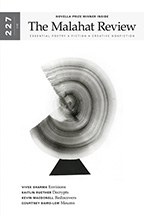Reviews
Poetry Review by Paul Franz
Sina Queyras, M×T (Toronto: Coach House, 2014). Paperbound, 91 pp., $17.95.
 Electrical currents, currents of rivers and oceans, floods, rains, skies like “wet wool,” the “humming silence” lurking in “civic pools”: such is the sensory landscape, alternately luscious and impoverished, familiar and apocalyptic, of Sina Queyras’s fourth poetry collection, M×T. Both aesthetically and thematically—in its concern with the trauma of loss, especially the loss of family members—it is evidently linked to her previous book, 2012’s stunning debut novel Autobiography of Childhood. That work, which vividly evoked and differentiated the voices of a group of adult siblings haunted by their past and by their sister’s imminent death from cancer, somehow managed to do so without ever relenting from a propulsive third-person prose style, coursing through the individual chapters like a family resemblance. Though the new book returns to similar terrain—what one already sensed was the novel’s autobiographical bedrock—its treatment is both more personal and more oblique. This partly has to do with the heightened ambiguity of the first-person pronoun, which can seem at once specific and airily featureless. But the objects of mourning are themselves somehow abstracted, kaleidoscopically renamed, diffused into their surroundings, or generalized into that shadowy multitude Queyras calls, with eerie familiarity, “the dead ones.”
Electrical currents, currents of rivers and oceans, floods, rains, skies like “wet wool,” the “humming silence” lurking in “civic pools”: such is the sensory landscape, alternately luscious and impoverished, familiar and apocalyptic, of Sina Queyras’s fourth poetry collection, M×T. Both aesthetically and thematically—in its concern with the trauma of loss, especially the loss of family members—it is evidently linked to her previous book, 2012’s stunning debut novel Autobiography of Childhood. That work, which vividly evoked and differentiated the voices of a group of adult siblings haunted by their past and by their sister’s imminent death from cancer, somehow managed to do so without ever relenting from a propulsive third-person prose style, coursing through the individual chapters like a family resemblance. Though the new book returns to similar terrain—what one already sensed was the novel’s autobiographical bedrock—its treatment is both more personal and more oblique. This partly has to do with the heightened ambiguity of the first-person pronoun, which can seem at once specific and airily featureless. But the objects of mourning are themselves somehow abstracted, kaleidoscopically renamed, diffused into their surroundings, or generalized into that shadowy multitude Queyras calls, with eerie familiarity, “the dead ones.”
Perhaps the greatest difference between the two books relates to the problem of closure. Bookended by the figures of two sisters—both artists, both queer, bound by multiple affinities yet never as closely or simply as desired—the novel remained recognizably a novel; without offering any easy answers, it was still fundamentally structured by the question of reconciliation. Similarly, it was not just the power and courage of the writing in its concluding chapter, which empathetically entered the claustrophobia of a loved-one’s collapsing body, but perhaps also simply the fact of coming last, that enabled it to represent death as an ecstatic release. More muted and tentative, shadowed by self-doubt, is the way MxT’s speaker tells us, “I held her briefly at the end because finally / She could not scowl me away. Felt her unlatch, / A small mass, rocketing like helium,” then adding: “I could see no verve, no afterburn, no spirit / Lingering, just my empty reaching out.” Difficult in what they represent, these lines also show the poet’s anguished struggle with the cultural repertoire of metaphors for dying. What she insists on questioning is not her own capacity, but rather the rightness of technologically prolonging their life.
This passage comes from the book’s longest experiment in verse as opposed to prose poetry—a sequence of unrhymed sonnets, originally published in this magazine. Dense with poetic allusions and inventiveness, it also takes up what another poem calls the problem of “how to be women artists in the world.” If Queyras criticizes her own occasional recourse to teleology, she also associates it (especially in her queasy final dig at Frederick Seidel), with a problematically masculine poetics, of which the traditional rhyming sonnet might be paradigmatic. Tributes throughout the volume to Sylvia Plath, Anne Carson, Lee Miller, and other women artists build up a counter tradition to the variously resisted, absorbed, and repurposed voices of Wallace Stevens, Walt Whitman, T. S. Eliot, and others. Equally complex is the book’s relationship with conceptual poetry—with whose writers Queyras shares friendships, but only occasionally, and equivocally, an aesthetic. The title M×T derives from what Queyras calls “Ohm’s Law of Grieving” (“Feeling = Memory × Time”), one of nine fanciful formulas and mechanical models for representing grief. Crucially, Queyras presents her ambivalence—between the self-contained electric circuit and oceanic openness—as a real one. Her notion of a device that would “prevent an excess of excessive feeling from damaging, i.e., exploding or blasting or otherwise bursting the surface of the physical vessel in which the circuits are housed” is obviously satirical; yet the wish is not simply dismissed. Instead, acknowledging this need deepens the major prose sections’ poignant vulnerability, their yearning for release and control: “Dear One, I am struggling to be in my body, struggling to stay where I am; I want to be closer to my memory of you. I am adrift without it.”
The struggle to stay where one is also means making the world, and those in it, more real. As Queyras writes, “I am not interested in other words for honey. I am interested in honey.” Paradoxically, though, the attempt to prolong the same experiences can itself lead to metamorphosis: “I am feeling about you the way waves feel about the shore. You come at me in endless loops, your moods, the looks on your faces, my lost ones, more alive by the minute, and the colour in your faces tinting with the seasons.” With its peculiar, intensive immersiveness, Queyras’s prose poetry seems particularly suited to this form of productive repetition, whose goal is not metaphor, but an enduring state of euphoria. Like its author’s other books of poetry and fiction, M×T is inventive, critical, imperfect, and exuberant. It is a vital work by an increasingly essential Canadian writer.
—Paul Franz









